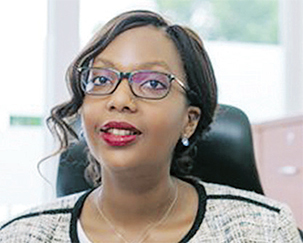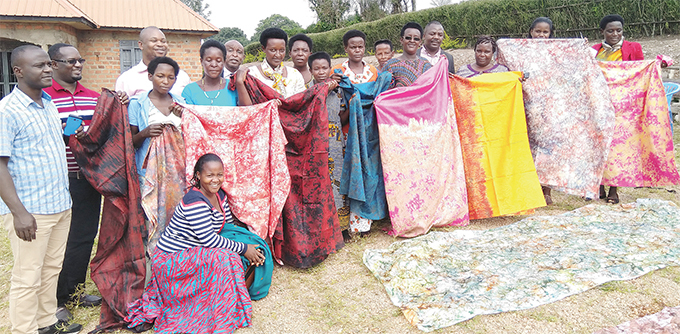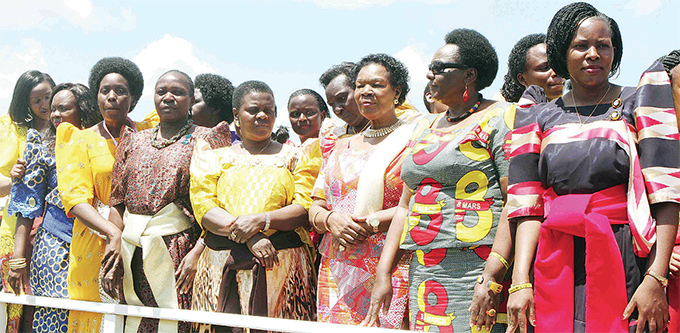Celebrating women innovators
Mar 07, 2019
INTERNATIONAL WOMEN’S DAY: Empowering Women Through Innovative Approaches to Social Protection

Celebrating women innovators changing the world
Today, Uganda joins the rest of the world to celebrate the International Women's Day. The local theme for this year's celebrations is Empowering Women Through Innovative Approaches to Social Protection; a Pre-requisite for Inclusive and Sustainable Development. Owen Wagabaza brings you profiles of some Ugandan women whose innovations are changing the world for the better
 Natalie Bitature, Musana Carts
Natalie Bitature, Musana CartsBitature is the proprietor and co-founder of the award-winning Musana Carts, the solar streetvending revolution, which provides urban street vendors with a cleaner, safer and more efficient solution to their cooking, storage and financing needs. She is motivated by the need to create an opportunity for people who have been stuck in a vicious cycle of poverty. "We want to raise the income of the urban poor and drive them to create a business solution that is a change-making tool. We also want to work for a cleaner, brighter and more innovative Uganda," Bitature explains. Bitature says the current model of food-vending is unsafe, environmentally hazardous and unsustainable to both the vendors and the public or environment for whom they prepare the food. "We want to reduce the negative environmental and health impact of the streetvending activities," she says. In 2016, Bitature was named among the top 30 Forbes List Africa, and in the same year, she was shortlisted in the top 10 innovators in Africa by the World Economic Forum. CLICK HERE FOR MORE ON THIS STORY
100,000 women benefit from UWEP
By Owen Wagabaza
Mary Grace Okori was a housewife in Otuke town council, Otuke district and entirely depended on her husband for survival.
In 2017, she heard a radio announcement calling on women to form groups through which they could access funding from the Uganda Women's Entrepreneurship Programme (UWEP).
Okori, together with other women, formed a group of 15 called Bedi Woro Women Group. After meeting all the necessary requirements, the group was given sh10m by UWEP to invest in their project of choice.
"As a group, we chose to venture into produce, not only because of the booming market, but also because it could earn us profits faster. We were spot on in choosing the entreprise because we have already started realising some benefits from this project,"Okori says.
She says she is getting money from the project to support the family. "Because of this small contribution to the family's wellbeing, my husband now respects me more and the domestic violence that had become a norm is almost no more. I see it as a life-changing project and I am grateful to the Government for this initiative. Thanks to the project, I am now able to feed my family and educate my children," Okori says.
 Members of a women's group display fabrics they made with UWEP support. Beneficiaries are selected through a community participatory process that involves local council leaders
Members of a women's group display fabrics they made with UWEP support. Beneficiaries are selected through a community participatory process that involves local council leaders
What is UWEP?
The Uganda Women Entrepreneurship Programme is a government initiative aimed at improving access to financial services for women and equipping them with skills for enterprise growth, value addition and marketing of their products and services.
Brenda Kifuko Malinga, the programme co-ordinator, explains that UWEP is implemented as a revolving programme under the Ministry of Gender, Labour and Social Affairs and is intended to empower Ugandan women for economic development.
"Launched in February 2016, the programme supports women entrepreneurs across the country poised to transform their societies by operating small and medium businesses," Malinga says.
She says the programme is designed to address the challenges women face in undertaking economically viable enterprises. The challenges include limited access to affordable credit, limited technical knowledge and skills for business development, limited access to markets as well as information regarding business opportunities. "Women are targeted in groups because the revolving fund is collateral-free, therefore, the group acts as the security for the loan.
It is also a cost-efficient mechanism for reaching poor and vulnerable people. The terms are friendly, bearing in mind that most of the women are engaged in agriculture as unpaid family workers and, therefore, need skills to begin and grow their incomegenerating enterprises," Malinga explains.
She adds that the programme is envisaged to increase participation of women in business development, increase their incomes, livelihood security and overall quality of life. CLICK HERE FOR MORE ON THIS STORY
Empowering women through social protection
By Owen Wagabaza
Uganda will today join the world in celebrating the International Women's Day. The day is meant to celebrate women's achievements, while calling for gender equality. It is a day that recognises the role and contribution of women to the development process all over the world.
It is celebrated each year on March 8. The day provides an opportunity to enhance advocacy for inclusion of women's concerns in the development agenda at all levels by calling on United Nations member states to design and implement interventions aimed as attaining gender equality and the empowerment of women. The day is marked around the world with arts performances, rallies, networking events, conferences and marches.
History
It is difficult to say exactly when International Women's Day began. Its roots can be traced to 1908, when 15,000 women marched through New York city in the US demanding voting rights, better pay and shorter working hours.
A year later, the first National Woman's Day was observed in the US on February 28, in accordance with a declaration by the Socialist Party of America. In 1910, a woman called Clara Zetkin, the leader of the ‘women's office' for the Social Democratic Party in Germany, tabled the idea of an International Women's Day.
She suggested that every country should celebrate women once every year to push for their demands. A conference of more than 100 women from 17 countries agreed to her suggestion and International Women's Day was formed. In 1911, it was celebrated for the first time in Austria, Denmark, Germany and Switzerland on March 19.
In 1913, it was decided that International Women's Day is celebrated on March 8, and it has been so since then. The day was only recognised by the United Nations in 1975 and since 1975, a theme has been created each year for the celebration. CLICK HERE FOR MORE ON THIS STORY
How is Uganda faring on gender equality?
The third most powerful political figure in Uganda is a woman. She is the Speaker of Parliament, Rebecca Kadaga. Years back, Specioza Wandira Kazibwe had even done better, becoming the second most powerful person in the country, when she was vicepresident between 1994 and 2003.
However, Kadaga and Kazibwe are not the only women who have superintended powerful positions over the years. Considerable progress has been made in women's participation in leadership and politics with women filling positions of influence, notably as ministers, Members of Parliament and top executives.
Currently, 33% of MPs are women and to a smaller extent this is reflected at lower levels of leadership, in the private sector and in institutions. However, although there have been efforts to narrow the gender gap through policies that promote gender equality such as the massive education enrolment, the situation of women and the gender gap in social, economic, health and political aspects remains dire and unacceptable.
 A group of women Members of Parliament at last year's Women's Day celebrations in Mityana district
A group of women Members of Parliament at last year's Women's Day celebrations in Mityana district
Dr Nelson Oyesige, a lecturer of social work and social administration at Victoria University, Kampala, says much of the achievement in Uganda is formal equality and not substantive equality.
He says it focuses on visibility of development results that have alleviated women's and girls' disadvantage relative to men and boys. On the global scene, Uganda stands fairly high in the effort to reduce the gender gap.
According to the United Nations 2018 Gender Gap Report, which scored a combined index of economic, education, health and political aspects of gender gap-indicators, Uganda emerged number 43 out of 149 countries assessed. However, Oyesige says there is still a disconnect between Uganda's positive legal framework and the lack of effective implementation or enforcement of the genderpositive laws and policies.
ADVERTS
NAGURU TEENAGE INFORMATION AND HEALTH CENTRE
MINISTRY OF ENERGY AND MINERAL DEVELOPMENT
